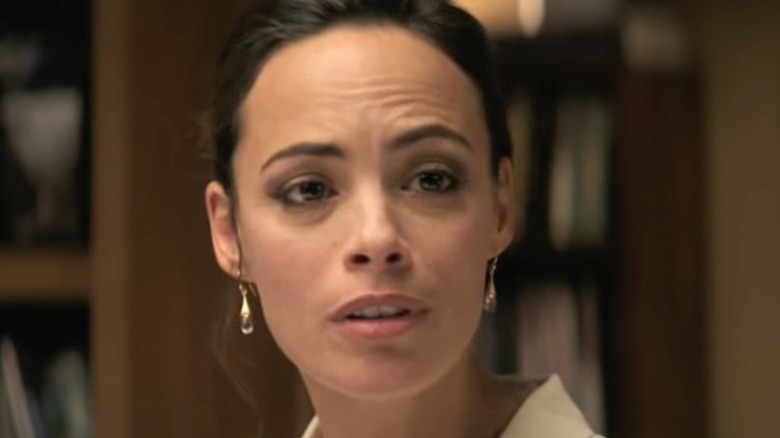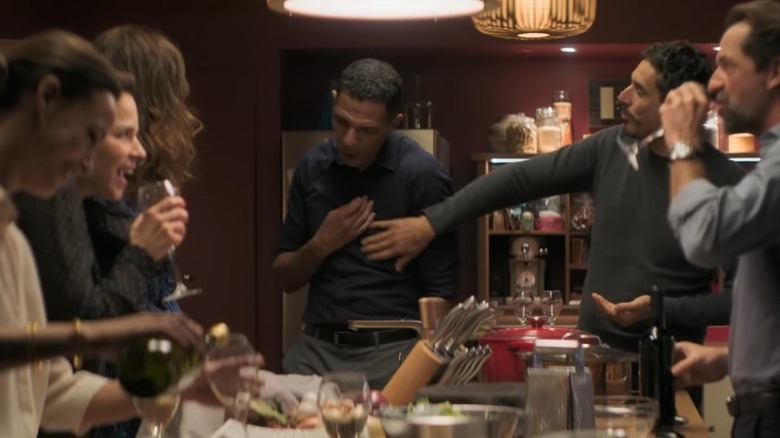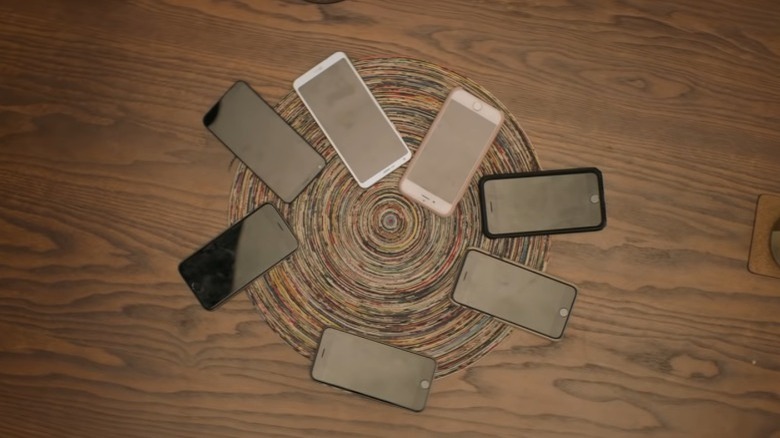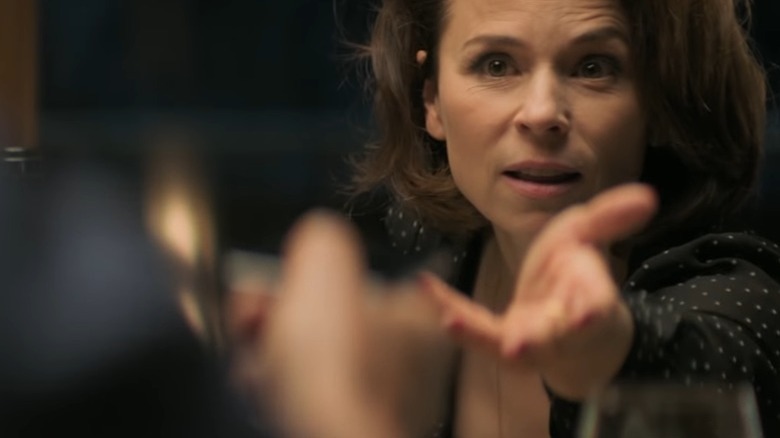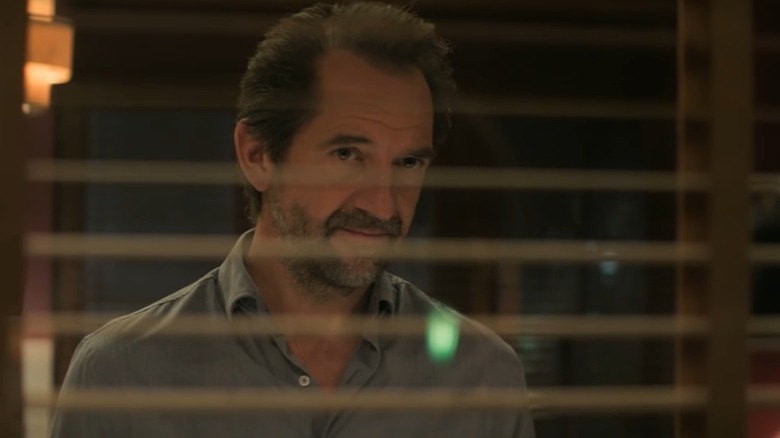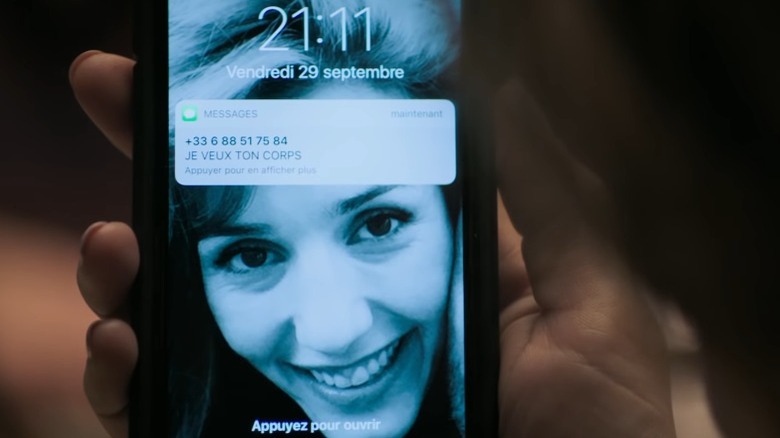The Ending Of Nothing To Hide Explained
Directed by Fred Cavayé, the French film "Nothing to Hide" continues to find its way to a myriad of viewers around the world ever since it hit Netflix in 2018. The film is unique and timely, in the style of "Black Mirror" as a comedy of manners, and it certainly answers for a lot of that appeal. In the self-contained, single-location plot, a group of friends at a dinner party play a game in which they all must leave their cell phones on the table and share the contents of any messages they receive with the rest of the party.
Although the characters try to play things lightly and shrug off the situation's inherent tension at first, it doesn't take long for compromising messages to start popping up and placing their reputations, social facades, and relationships with each other in jeopardy. By the final third of "Nothing to Hide," the uneasiness and discomfort of the game has developed into a full-blown crisis for the characters, with frustrations and conflicts that cannot possibly be solved within the bounds of a casual dinner party. The way the film then chooses to wrap up its story is a very deliberate one, with a lot to reveal about its ultimate outlook on relationships, secrets, and the meaning of trust in the modern world.
Everybody learns a little too much
Over the course of "Nothing to Hide," every one of the film's seven assembled pals turns out to be hiding something. Hosts Vincent (Stéphane De Groodt) and Marie (Bérénice Bejo, known stateside for "The Artist") face a bitter marital struggle as the former is revealed to be consulting with a psychiatrist without having told his own psychiatrist wife, and the latter covertly navigates an affair with Thomas (Vincent Elbaz). Thomas himself is also having an affair with his boss Carole (voiced by Carole Centrale), who is pregnant with his child. Thomas' wife Léa (Doria Tillier) is still in touch with her ex-boyfriend and is helping him through the process of moving on. Charlotte (Suzanne Clément) and Marco (Roschdy Zem) both learn that they're separately maintaining sexual flings over the internet. Lastly, Ben (Grégory Gadebois) is revealed to the audience as being gay.
As the movie wraps up, these revelations prompt the characters to make a series of momentous decisions. Léa announces to Thomas that she is leaving him. Ben comes out to the group, then revealing that he has in fact been fired from his job as a private high school teacher for this very reason. Charlotte and Marco come to terms with each other's tentative infidelity and manage to reconcile. The whole group opts to leave Vincent and Marie's apartment, thus leaving things in a state of fraught suspension. But then, the movie's final reveal hits.
The film ultimately posits itself as a hypothetical
The beginning of "Nothing to Hide" establishes that the whole movie is taking place during a total lunar eclipse. At the end of the film, it is revealed that the strangeness and mystery of this cosmic phenomenon has seeped into the structure of the film we're watching — just as the eclipse ends and the moon slides back into full view, we are brought back to the "real" timeline of the film's universe, one in which the game never actually happens.
The entirety of the plot, with all its twists and turns and slaps and fights, is shown to be just a what-if scenario, a glimpse into a hypothetical world in which the characters go through with Marie's game idea. In reality, however, the characters of "Nothing to Hide" quickly realize the game is a bad idea and have a normal, pleasant evening together, in which no big secrets come out and no relationships are ruined. Everything we watch throughout the movie is just the way things could unfold, but don't.
The game brings about unnecessary tension and conflict
Many of the conflicts in the film can be categorized as petty, superfluous interpersonal conflicts that we'd all rather not go through and are just fine not ever being made privy to. Léa's continuing relationship with her ex is nothing to write home about, and discovering it only causes Thomas to fret unnecessarily. Vincent has reasons of his own to keep mum about his sessions with a psychiatrist, and they have little bearing on the healthiness of his relationship with Marie.
Charlotte, meanwhile, hasn't told Marco yet about her intentions to look for a retirement home for his mother, but only because there hadn't been a good reason to tell him before she had made up her mind about it. In effect, all that comes of Marco knowing about it is that Charlotte's personal feelings about his mother are made public prematurely, but she arguably has a right to keep those feelings private until she's ready to share them with him.
For the most part, the drama of the hypothetical scenario shown in "Nothing to Hide" comes less from masks removed and trusts betrayed, and more from the old routine of human beings obsessing over problems that only exist in their own heads. This makes perfect sense — after all, knowing such a routine would be forthcoming is precisely the reason they decline to play the game in the first place.
The characters are better off not knowing each other's secrets...
"Nothing to Hide" concludes with Vincent and Marie disagreeing about whether or not they should play the game after all. As Marie laments the fun they could have, Vincent — watching their friends leave happily and on good terms with each other — notes that they're better off not knowing that much about each other.
Vincent's stance on the matter points toward the film's own ultimate thesis: that relationships, be they friendly or romantic, are only functional inasmuch as they're a bit opaque. For all the value we may place on full sincerity and transparency in theory, the truth is that in practice, we likely want some elements of other people's lives to be kept out of our view.
Solving all of the conflicts that would stem from a life without secrets would simply be too laborious, emotionally and mentally. The majority of our relationships are conducted within a safe, ideal zone in which we know enough about each other to form connections, but not enough to become uncomfortable or put off. The ending of "Nothing to Hide" is, ostensibly, a happy one. It's a nice dinner party, everyone has fun, and they move on with their lives, as it should be.
But still, there's a nagging feeling that doesn't quite go away after that final, peacemaking reveal — and that feeling is what makes the movie really interesting.
...or are they?
Sure, most of the bad blood at the conclusion of the what-if sequence in "Nothing to Hide" is banal. A lot of those problems aren't even really problems, just inevitable consequences of butting in on other people's privacy. But some of the conflicts are serious, and very much the sort of secrets we might actually want to know if our loved ones were keeping them from us.
The infidelity that Marie and Thomas are engaged in, for instance, is the kind of thing that generally must be faced head-on, for better or worse, if healthy relationships are to be pursued. The bitter truths that Ben would've learned about his friends' thinly-veiled homophobia are also better left out in the open, where he would get the opportunity to deal with them as a gay man. Ultimately, the conflict Charlotte and Marco would've gone through also would've strengthened their bond, allowing them to strip themselves of disguises and meet each other in a more truthful place.
The ending of "Nothing to Hide" is happy on the surface. But it is also an ending in which Léa is about to have children with a man who's cheating on her with two women at the same time, Ben is in a group of friends who might not accept him as much as he thinks they will, and Charlotte and Marco are still pretending not to see their own relationship problems. The film leaves us with the question of which truths are better left alone, and which ones are better being directly addressed.
